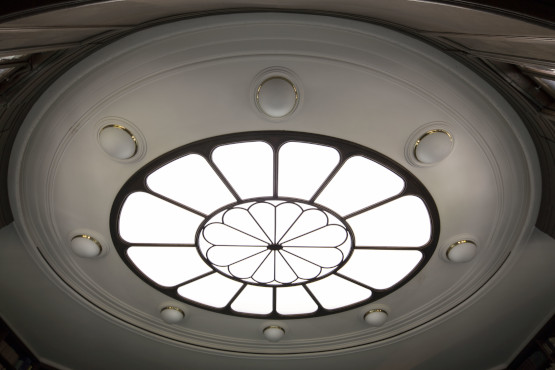Journal

160307-Warburg-Haus_61E6924-22Mp-Foto-UHH,_RRZ_MCC,_Mentz#59F2
Foto
Symbolic Forms. The »Myth« and its Political Forms
Schwerpunktthema 2025
In 2024, the 150th birthday of the great thinker Ernst Cassirer was celebrated. 2025 is also a significant year in the Cassirer cosmos: the second part of the Philosophy of Symbolic Forms was published in 1925. In the volume entitled Mythical Thought, Cassirer develops his theory of myth as one of the »symbolic forms« that make up the system of culture: When Cassirer speaks of »myth«, he means only among others, the characteristic narrative of the world-forming origin story ; he also uses the term pars pro toto to refer to »mythical thinking«, »mythical consciousness« and »mythical way of life«.
The thematic focus will provide space and opportunity to explore the cultural-historical development and current relevance of mythical thinking in social and political dimensions, in which we are currently experiencing how it unfolds its powerful effect. Mythical consciousness is determined by the dominance of emotion. And it is obsessed with the power of images. Its explosiveness lies in its lack of abstraction and reflective distance. As an elementary form of creating meaning through symbolization, it is always tied to the expressive phenomenon, and its hallmark is the in-difference of sign (word or image) and thing.
Following Cassirer, mythical thinking is by no means an archaic stage of development. With him, we can understand it as the native soil of culture. The span and permanence of effect are suggested in this metaphor and the perspective of cultural development into the future is included. It is thus understandable that, despite his extensive study of early and indigenous cultures, Cassirer places just as much emphasis on the continued assertion of mythical consciousness in the world shaped by modern science – including and especially in its political forms. This also explains why in 1946 he can title his late study of the elements of totalitarian thinking: The Myth of the State.
The program of academic lectures and events takes place in close cooperation with various partners and institutions. In fall 2025, an international course of study for young academics on »A Postcolonial Condition? Art, Literature, Film, and the Everyday in Eastern Europe« is jointly organized by Petra Lange-Berndt, Department of Art History, Anja Tippner and Marina Gerber, Institute for Slavic Studies, University of Hamburg, and the Aby Warburg Foundation.
As part of the focus topic lecture series, Andreas Dorschel, University of Music and Performing Arts Graz, Universität Hamburg Fellow 2024-2025 at the Hamburg Institute for Advanced Study, Jana Graul, Kunstgeschichtliches Seminar, Universität Hamburg, and 2025 Warburg Professor Claudia Mattos Avolese, Tufts University, will speak in the first half of the year. Further events in cooperation with partners complete the programme: An evening on the Surrealist Revolution with a projection of the two central films of Surrealism, An Andalusian Dog (1929) and L’âge D’or – The Golden Age (1930) by Louis Buñuel and Salvador Dalí on the occasion of the publication of the new German translation of the legendary magazine La Révolution Surréaliste (1924-1929, 12 issues) in cooperation with Flexibles Flimmern – Das mobile Kino and Textem Verlag, Hamburg, a seminar in the exhibition Glitter at the Museum für Kunst und Gewerbe, a dialogic tour of the exhibition Lenin’s Death. A Section at the Hamburg Museum of Medical History, an international public symposium: From the Cosmos to the Commons: Towards the Planetary Public Sphere in cooperation with the Stadtkuratorin Hamburg and a dialogic tour of the international double exhibition in the Galerie der Gegenwart of the Hamburger Kunsthalle, Edi Hila | Thea Djordjadze.
Der »Mythos« und seine politischen Formen